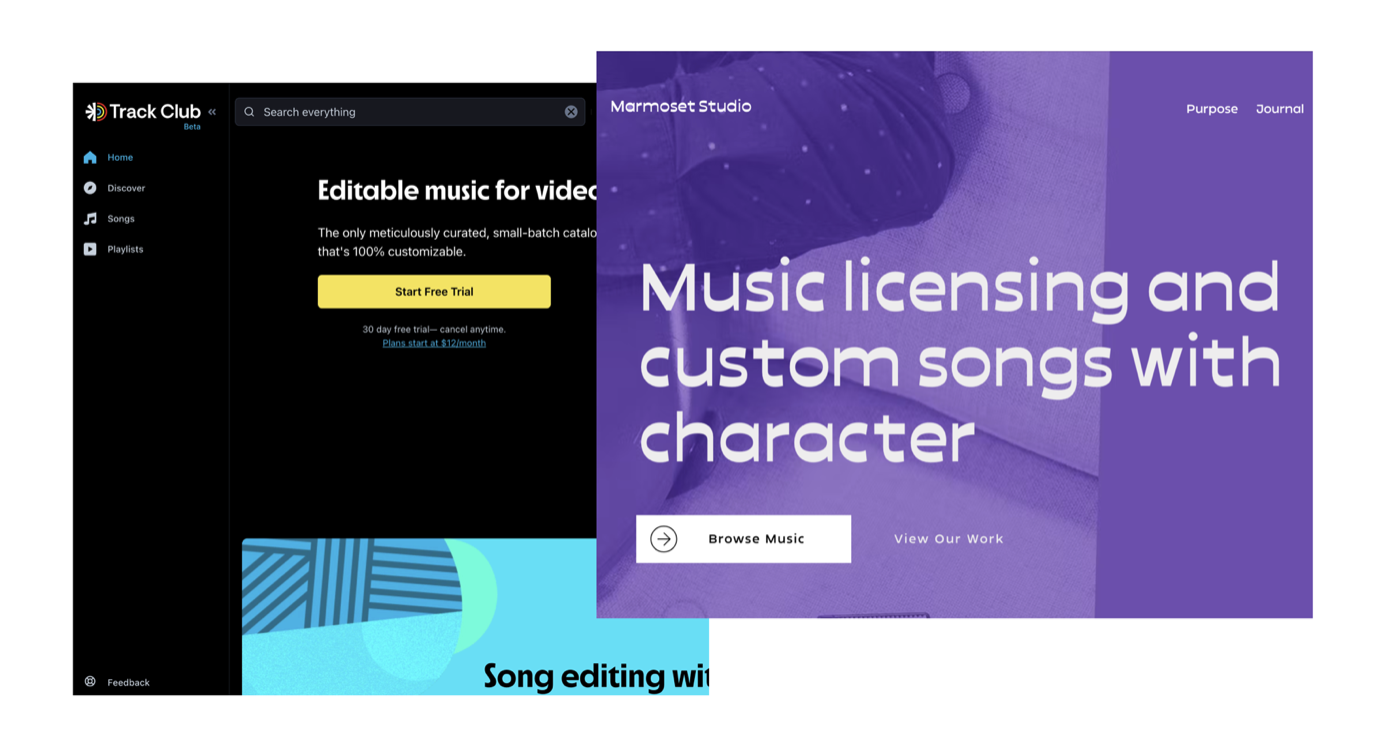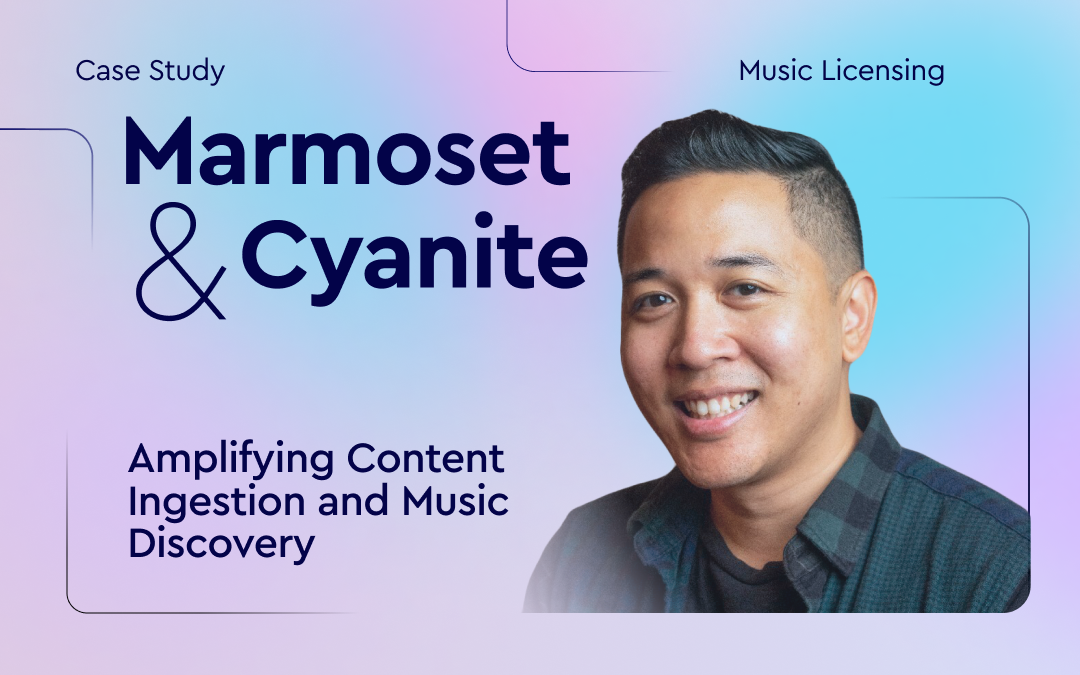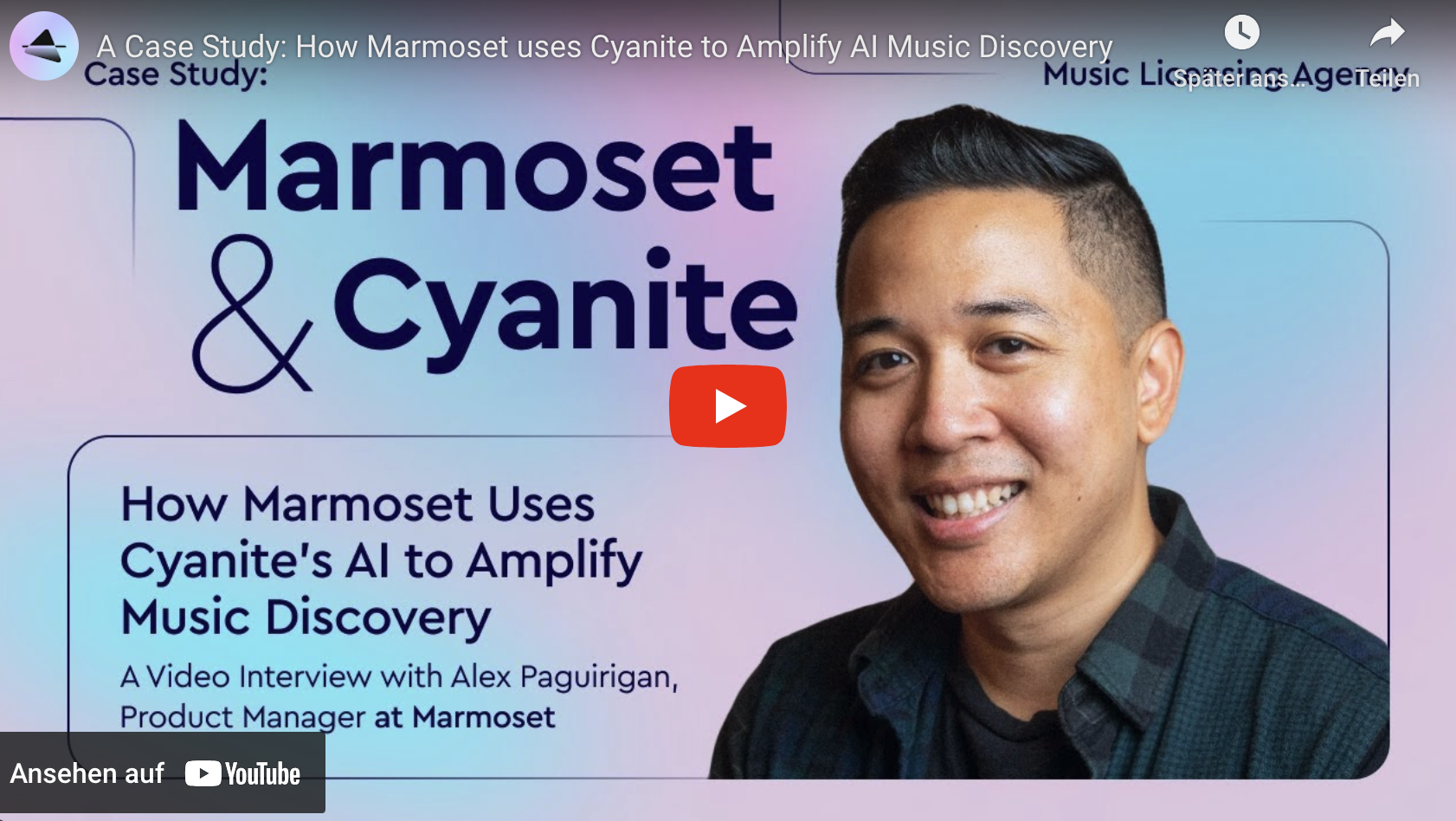Last updated on November 3rd, 2025 at 05:01 pm
Founded in 2010, Marmoset is a full-service music licensing agency representing hundreds of independent artists and labels. At the heart of it, their core experience involves browsing for music. They offer music discovery for any moving visual media. From sync (movies & TV) to advertisements, video games, and wedding videos. Powered by Marmoset is Track Club, which is subscription-based as opposed to a la carte or custom licensing. Find out below how they use Cyanite for both of their services to amplify AI music discovery.
In 2019 Marmoset became the first Certified B Corporation music agency on the planet, providing tangible metrics, social sustainability, and fulfilling environmental standards.

“We utilize Cyanite’s API and web app on a daily basis for auto-tagging, and similarity search.”
The Key Elements Within this Case Study
- Challenges that Marmoset encountered before engaging with Cyanite.
- Exploring the specific Cyanite solutions currently employed by Marmoset.
- Understanding the benefits Marmoset derives from Cyanite’s AI solutions.
- Delving into the integration process.
- Marmoset’s future roadmap and strategic outlook.
“What made you initially reach out to us and how do you use Cyanite today?”
“Before I was a product manager, I had a catalog management position tagging music with metadata manually. Because of how subjective music is, we always wanted to make sure that a human was behind the wheel to attribute metadata.”
“But when it comes down to calculating the BPM and key of any given song, you would have to put someone behind a piano with a metronome, which is completely unsustainable and a strange use of labor. So that, plus the challenge of significantly growing our catalog told us – we are behind the times here.”
Initially, Marmoset was trying to improve and speed up their tagging process with Cyanite. 1.5 years later they ended up with much more than only a tagging solution. To make their catalog even more discoverable they integrated an additional solution powered by Cyanite: the Similarity Search.
The Products that Marmoset Currently Uses
Web App – Allows you to upload your entire catalog into your Cyanite library, creating your own Spotify with our Similarity Search and Free Text Search. No coding required.
API – Lets you integrate Cyanite into your own system. Implement Cyanite’s full-scope analysis and search technology into your current environment! Coding skills required.
Auto-Tagging – Let Cyanite tag your music with Genres, Moods, Keywords, Brand Values, Auto-Descriptions, and much more. Explore all the tags.
Similarity Search – Get similar songs recommended for either tracks from your library or external reference tracks from Spotify and YouTube.
Using these in combination allows for superior AI music discovery.
How Marmoset Benefits from Cyanite – AI Music Discovery
[Click on any of the headings below to find out more about them.]
Reduced search time for the right songs
“We never want to be a site or a product that you spend hours of your day on. We would much rather you look through fewer things and get what you need within 10 minutes and never visit the site again because you already have exactly what you need. And this feature definitely helped with that.”
Faster song-to-market time
“Some artists and labels offer us their entire back-catalog dating back over 20 years. There’s only so much time in the day for a human to tag all of that and although we are still humanly involved in the tagging, Cyanite gives us a head start with this.”
“We don’t want to tell an artist ‘Hey, you’re gonna have to wait a bit because it takes time to tag your music and get it in the system.’”
AI music discovery with a consistent language across Marmoset's catalog
“After I learned Marmoset’s internal tagging system and got a lot of practice with tagging the first 50-100 songs without any assistance, I suddenly developed my own system within a system. And I stuck with that.
When you’re tagging the music with the help of Cyanite, it forces the person behind the computer to reconsider what they hear.”
“On the worst days, that means you are questioning your musical knowledge. But on most days, Cyanite hears something that you don’t, and you expand your knowledge of music because you reconsider your judgment call. Or it gives out the exact tags that you thought of before and simply reassures you in your confidence.”
“And that only makes our catalog stronger.”
“Someone in Germany may have a very different definition of confidence, so it allows us again to close that gap of mistranslation or misunderstanding between people who may come from completely different cultural backgrounds, but still need to get their confident song into their Instagram Reel for 2024.”
Want to know what tags we are talking about? Check out our full tagging taxonomy here.
Exploitation of hidden and unknown parts of the catalog
“When getting a brief like ‘sunny and happy, with an acoustic guitar, piano, et cetera, et cetera’ we are talking about tens of thousands of possibilities here. Plus sometimes you only have half an hour to answer that brief.”
“While our catalog and search team are very well versed in our catalog, they naturally have their own internal biases and favorites—after all, that’s human. Cyanite adds some objectivity to that.”
As Jakob, one of our founders would say: “The AI doesn’t care if you’re Ed Sheeran or a bedroom producer. If your track fits the reference, it will surface it.”
Using Spotify & YouTube references to answer briefs
“With other types of briefs such as ‘Hey, this is what the head of music at McDonald’s loves but we can’t afford this song.’, using external reference tracks from Spotify or Youtube to find similar-sounding tracks in our catalog made things very easy for us.”
Increasing fair treatment of artists
“The moment we press ‘show similar songs’, the AI gives chances to people who may not have had the benefit of having that one crucial tag that would have surfaced their song to the top of our browse experience.”
“Maybe we’ve missed that when we tagged it back in 2016. Cyanite doesn’t care about that. Cyanite just says ‘This is a pretty good track based on what you’ve liked so far.’”
This way all artists benefit from AI Music Discovery.
Faster onboarding of new team members.
How Long did the Integration Take?
“Markus and Joshua were fantastic partners. Overall it took a few months to launch the ‘show similar songs’ button. But to be fair…could it have taken a shorter amount of time? Absolutely.”
“We did it in a very careful and methodical way. We put Cyanite under quite a serious magnifying glass, before committing and giving it out to our users.”
Check out the API docs to learn more about the process of integrating Cyanite into your system.
Where Is Marmoset Heading With All This?
“We are in a transitional period and we’re going to be considering full auto-tagging. There also always will be a human verification step, so it will always remain a human process. Compared to how we do things now, the idea is that Cyanite fits in a little earlier in the process as opposed to later.”
“We will start trying to find creative ways to utilize what is ultimately a very robust, very flexible amount of metadata not just to our benefit, but of course, to our end users’ benefit so that they can find the music they want faster.”
Marmoset AI Music Discovery – Long Story Short
Marmosets’ seamless integration of Cyanite into their workflow demonstrates the transformative impact of technology on the music industry – both facing the user front-end as well as internally improving workflows.
Combining trust in human processes and cutting-edge AI, Marmoset continues to define the future of music and AI music discovery.
Interested in trying out Cyanite for your company? Get in touch with us, or click the sign-up button below.
Many thanks to Alex Paguirigan for providing these amazing insights about how Marmoset uses Cyanite!


